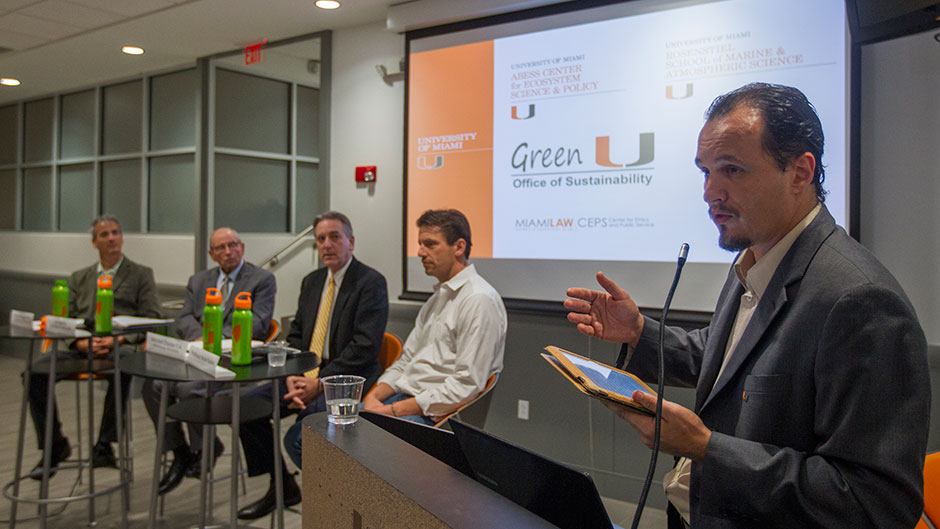Dozens of students, faculty, local government officials, and community members gathered on campus Monday to hear panelists discuss the legal, financial, and policy issues regarding sea-level rise in South Florida.
The discussion, entitled Sea-Level Rise and its Impacts on Coastal Policy in Southeast Florida and hosted by the University of Miami’s Office of Sustainability, Green U, kicked off the University’s Earth Week events.
Among many effects of climate change, sea-level rise in South Florida is already threatening local residents and businesses. With an estimated rise in sea levels along the South Florida coast ranging from three to six feet by the end of the century, how will communities be affected financially, legally, agriculturally, socially and in terms of health and wellbeing?
The panel discussion helped address these issues and more.
A topic that received considerable attention was how local governments may be held legally and financially responsible for failing to do enough to protect its citizens from the impacts of sea-level rise.
“Local governments may wind up having to pay millions to its constituents for failure to upgrade or maintain infrastructure, which increases vulnerabilities to sea-level rise,” said Thomas Ruppert, an attorney and a coastal planning specialist at the Florida Sea Grant Program.
Ruppert advocated for local governments thinking in all timescales, short- mid- and long-term, in preparing for sea-level rise consequences.
At the same time, however, “individuals have to be responsible, too, and local government can’t be held accountable as the ultimate purveyor of solutions,” noted Jim Murley, recently-appointed Miami-Dade County’s chief resilience officer.
“No one was forced to live in Miami and no one will be forced to leave. We have freedom of choice. Urban economics is a powerful thing. Probably more powerful than any policy we can implement,” said Murley.
Mitchell A. Chester, a civil trial lawyer and an editor for several online publications on the impacts of sea-level rise, is adamant about protecting the most vulnerable and less affluent communities in South Florida through financial, legal, housing, and social adaptation strategies. Those populations, he said, will be the first and worst hit by sea-level rise impacts and other climate change effects.
“If we continue to ignore this, ultimately this becomes a crime against humanity. Our kids will be climate refugees,” said Chester.
While local and state governments should do what they can to adapt to climate change and sea-level rise and protect natural ecosystems, Brian Soden, professor of atmospheric sciences at the Rosenstiel School of Marine and Atmospheric Science, said that “ultimately the fate of the Everglades and similar natural places is up to the federal government and working with other countries to lower carbon dioxide emissions.”
Mitigation at the global level should be combined with adaptation at a more local level, he said.
The discussion was moderated by Teddy Lhoutellier, Green U’s sustainability manager.
Please take a minute to review the University’s Climate Change Special Report at http://climate.miami.edu.

